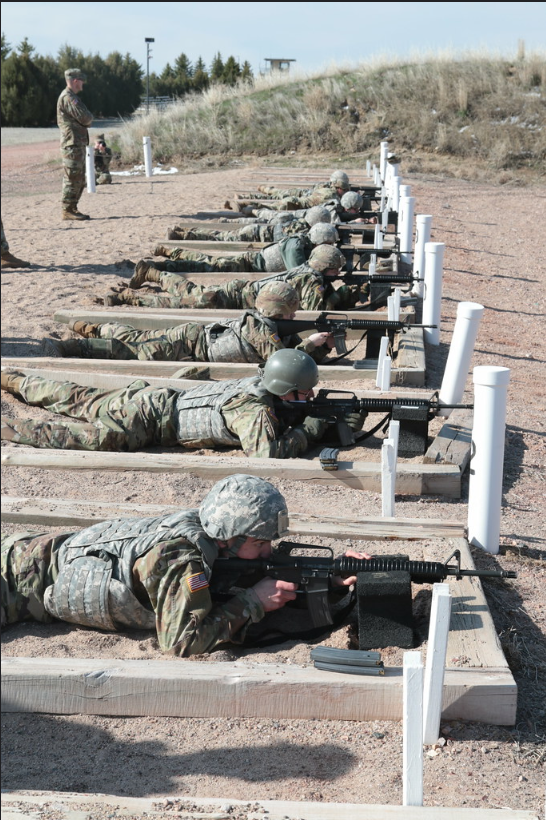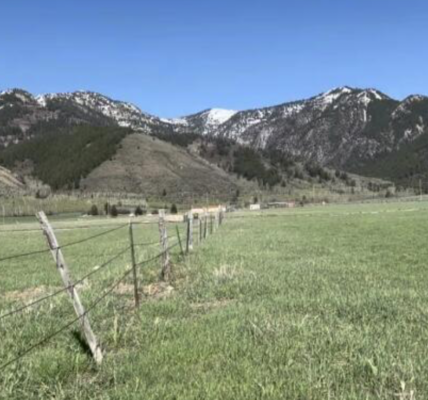
the firing range at Camp Guernsey on April 13 during Wyoming’s Best Warrior
Competition. (Wyoming Army National Guard photo by Sgt. Jack Eden)
By Tennessee Watson, WyoFile.com
Following whistleblowers’ complaints about the handling of sexual harassment and sexual violence in the Wyoming National Guard, the Legislature and governor have taken steps to strengthen accountability for perpetrators and those who fail to address abuse when it happens under their command.
Lawmakers passed two bills during the recent session to address harassment and discrimination in the guard, and a third to increase accountability for perpetrators of sexual assault.
Senate File 45 – Military department-annual report requires the Wyoming Military Department to present the Legislature with information about sexual harassment, discrimination and assault cases no later than Oct. 31 each year.
House Bill 53 – Military department-discrimination or harassment grievances funds a full-time position at the Wyoming Department of Workforce Services to investigate allegations of harassment and discrimination within the guard.
The need for such a position grew from concern that victims of workplace hostility have limited recourse when the guard fails to respond appropriately. With the passage of HB 53, guard members and employees who’ve experienced discrimination, harassment or retaliation can also turn to Workforce Services for support and accountability. “We’re completely removed from the military department, so we’re going to be impartial,” said Jason Wolfe, workforce standards administrator for Workforce Services.
A third bill, Senate File 40 – Criminal record dissemination-military department enhances the guard’s ability to hold perpetrators of sexual assault accountable.
According to National Guard Bureau procedures, internal investigations of sexual assault are not permitted, so the Wyoming Guard refers cases to external agencies. Under certain circumstances cases are investigated by the National Guard Bureau, Air Force or Army, but most of the time they’re referred to local law enforcement. When an investigation concludes, it’s up to county attorneys to prosecute — a decision that can take a long time if it happens at all, according to Chris Smith, senior legal counsel for the Wyoming Guard. “We have had several cases where local law enforcement recommended prosecution for sexual assault, and for whatever reason, the county attorney or the district attorney said ‘eh, it’s he-said, she-said and there’s not enough evidence to prosecute.’”
Given their caseloads, Smith said, it makes sense that local prosecutors wouldn’t take cases they don’t think they can win, but that shouldn’t end efforts to hold perpetrators accountable and to keep victims safe. That’s where SF 40 comes in. Smith said the legislation gives the Wyoming Military Department access to the sexual assault investigations referred to local law enforcement, providing the guard with the information it needs to pursue accountability internally.
The burden of proof for a military court martial is the same as a criminal trial — beyond a reasonable doubt — but Smith said when it’s difficult to prosecute sexual assault, the guard can also take administrative action to hold perpetrators accountable.
“We can demote people and take away their rank … we can send them to schools and make them do additional training,” he said.
The guard can also use administrative separation to keep perpetrators away from their victims, Smith said. “So unlike the civilian criminal prosecutor who really is like, ‘do I take him to court or not?’ We have a whole panoply of things we can do. We may not be able to throw them in jail, which requires a court, but we can certainly impact their lives negatively, and if need be, get them out of our force.”
Concerns about sexual harassment and sexual assault in the military are not isolated to Wyoming. Advocates have been calling for reform for decades, but the death of Spc. Vanessa Guillén, who was murdered by a fellow soldier in 2020 at Fort Hood, Texas, motivated the federal government to take a closer look at gender-based violence in the military.
A flurry of federal policy shifts ensued, including the removal of sexual assault, sexual abuse, sexual harassment and retaliation investigations from the chain of command and the establishment of sexual harassment as a punishable crime in the military.
Wyoming National Guard Adjutant Gen. Gregory C. Porter told WyoFile the new state and federal laws are a first step with more work to come. Statutes alone won’t change the guard’s culture, he said, and in an effort to ensure command isn’t overlooking areas in need of improvement, Porter made a request to Gov. Mark Gordon for an external review.
The governor honored the request, appointing Administration and Information Director Patricia Bach and Workforce Services Director Robin Cooley to complete the review, which “will examine adherence to processes and procedures related to the filing and handling of diversity, inclusion, and sexual harassment complaints,” Micheal Pearlman, communications director for Gov. Mark Gordon, wrote WyoFile in an email. “The assessment will recommend ways to improve those processes, as well as provide suggestions and recommendations for operational changes and suitable improvements to legislation, if appropriate.”
There’s no deadline to complete the process, according to Pearlman, because the governor wanted “to ensure the directors were given enough time to conduct a thorough review, given their other responsibilities.”
Upon completion of the review, a report of the findings will be presented to the governor and made available to the public.
Smith told WyoFile he believes the guard is doing a good job, but he said there are always blindspots. His hope for the external review is to “come up with some good recommendations that we’re just blind to.”






